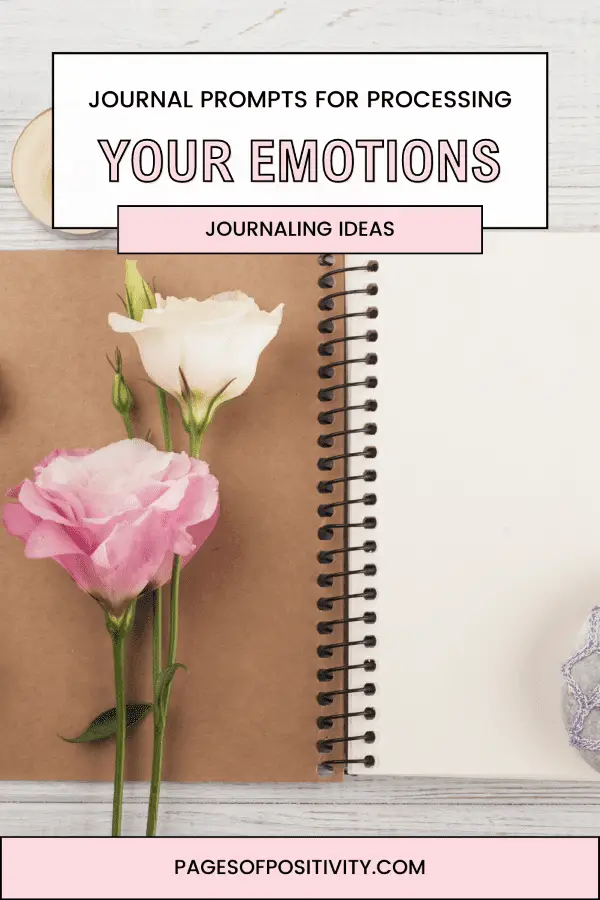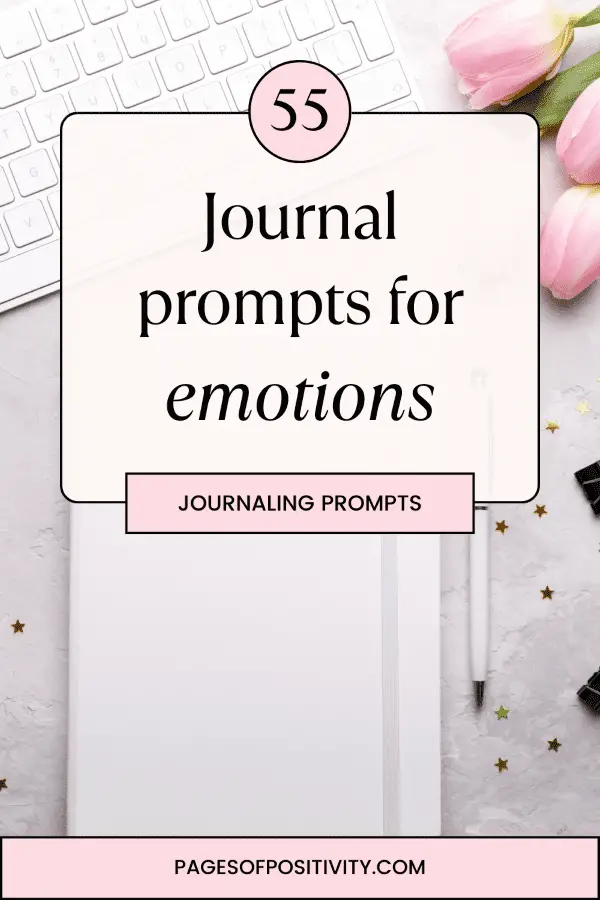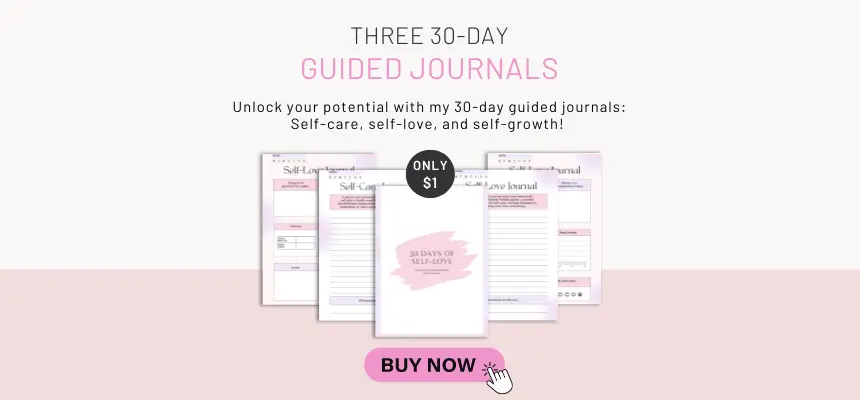A list of emotional writing prompts to help you process your emotions
Today, we’ll explore journal prompts for processing emotions.
Life can be quite an emotional adventure. It’s only natural to feel overwhelmed or uncertain at times.
In this post, I’ll give you a list of unique and engaging journal prompts for processing emotions that are designed to guide you through various emotions.
Whether you’re experiencing joy, sadness, anger, or confusion, these emotional journaling prompts will be your trusted companions on the path to emotional clarity.

This post may contain affiliate links. That is, if you click on a link and buy something I recommend, I will receive a small compensation at no additional cost to you.
55 writing prompts for expressing emotions
15 journal prompts for emotional healing
- Reflect on a recent challenging experience that triggered strong emotions. How did it make you feel, and what lessons can you learn from it?
- Write a letter to your younger self, offering words of comfort, encouragement, and forgiveness.
- Describe a time when you felt deeply hurt or betrayed. What emotions surfaced during that experience, and how have they impacted you since then?
- Explore a past relationship that caused emotional pain. What lessons have you learned from it, and how have you grown as a result?
- Write about a loss or disappointment that still lingers in your heart. How can you find closure and begin the healing process?
- Describe a situation where you felt overwhelmed by stress or anxiety. How did it affect you emotionally, and what coping strategies can you implement to find relief?
- Write a gratitude letter to yourself, acknowledging your resilience and strength in overcoming past emotional challenges.
- Reflect on a mistake or regret from your past. What emotions arise when you think about it, and what steps can you take to forgive yourself and move forward?
- Write about a person or experience that brings you joy and happiness. How can you incorporate more of these positive elements into your life to foster emotional healing?
- Describe a self-care practice or ritual that helps you nurture and restore your emotional well-being.
You might also like: Powerful journal prompts for self-love that you must try
- Think about a fear or belief that holds you back emotionally. How can you overcome it to experience growth and healing?
- Reflect on a time when you showed compassion and forgiveness to someone who hurt you. How did it contribute to your own emotional healing?
- Write a letter to someone who caused you emotional pain, without sending it. What emotions and insights arise from this process?
- Describe a situation where you felt shame or guilt. How can you release these emotions and cultivate self-compassion and self-forgiveness?
- Reflect on a moment of self-discovery or personal growth. What emotions were involved, and how can you use those emotions for further healing?
You might also like: Practical productivity journal prompts to increase productivity
15 journal prompts for emotional intelligence
- Think about a recent situation where you handled your emotions well. How did you do it, and how did it lead to a positive outcome?
- Write about a time when you struggled to understand and control your emotions. What could you have done differently, and how can you apply those lessons in the future?
- Describe someone who is an emotional role model for you. What qualities do they have that you admire, and how can you learn from them?
- Write about a challenging interaction where you had trouble understanding someone’s emotions. How did it affect your relationship, and what can you do to improve your empathy?
- Reflect on a time when your emotions influenced your decision-making. How did you realize it, and how can you make more emotionally intelligent choices?
- Describe a situation where you diffused a conflict using emotional intelligence techniques like listening and empathy. How did it help the outcome and the relationships involved?
- Write about an experience where you received criticism or feedback. How did you emotionally react, and how can you respond more constructively in the future?
- Reflect on a time when you had to navigate a diverse and emotionally charged group. How did you adapt to different perspectives and emotions, and what did you learn?
- Describe a relationship where emotional intelligence is important. How can you better understand the other person’s emotions and strengthen your connection?
- Write about a situation that triggers strong emotions like anger. How can you develop self-awareness and control to manage those emotions effectively?
- Think about a time when you helped someone through a tough emotional experience. How did your understanding and care make them feel better, and how did it strengthen your connection?
- Describe a difficult conversation or argument you’ve been avoiding. How can you handle it with emotional intelligence, considering both your feelings and the other person’s?
- Write about a time when you felt misunderstood or ignored in a group. How can you express your feelings better, so your needs are met without hurting others?
- Reflect on a recent failure or setback. How can you develop emotional strength to recover from such situations and stay positive?
- Describe a time when you saw someone lacking emotional intelligence. What did you learn from it, and how can it remind you to improve your own emotional intelligence?
You might also like: My favorite Sunday journal prompts that you will love
20 journal prompts for mental health
- Think about three things that you feel grateful for today and how they make you feel good overall.
- Describe a self-care activity that brings you joy and makes you feel refreshed. How can you make it a regular part of your routine?
- Write about a recent challenge you faced and how you overcame it. What strengths did you discover in yourself during this time?
- Think back to a time when you felt overwhelmed or stressed. What can you do to better handle stress and create a sense of calm in your life?
- Describe a positive saying or phrase that inspires you. How can you remind yourself of it daily to believe in yourself and think positively?
- Write a letter to your future self, imagining a life where you have good mental well-being, strength, and fulfillment. What steps can you take now to make that happen?
- Reflect on a personal boundary you need to set to protect your mental health. How can you communicate and maintain this boundary effectively?
- Describe a hobby or activity that helps you relax and find peace within yourself. How can you make it a priority and find more time for it?
- Write about a person or group that has positively impacted your emotional well-being. How can you nurture and keep those connections for ongoing support?
- Reflect on a negative thought or belief that often comes to mind. How can you challenge and change this thought to have a more positive and empowering mindset?
- Think about a time when you felt really proud of yourself and what you accomplished. How can you celebrate and acknowledge your successes more often?
- Write about a tough emotion or experience that you’ve been avoiding. How can you make a safe space to face and deal with it, maybe by seeking support if you need it?
- Reflect on your sleep habits and patterns. How can you improve your sleep routine to feel better mentally and be healthier overall?
- Describe a time when things didn’t go as planned or you faced a setback. How can you learn from it and be kind to yourself as you move forward?
- Write about a positive saying or phrase that inspires you. How can you remind yourself of it regularly to believe in yourself and think positively?
- Think back to a moment when you felt connected to nature. How can you spend more time outdoors or do activities in nature to feel better mentally?
- Describe a book, podcast, or resource that has helped your mental well-being. What have you learned from it, and how can you explore similar things in the future?
- Write about a high expectation you put on yourself that affects your mental health. How can you let go of it and be more gentle and kind to yourself?
- Reflect on a healthy boundary you need to set with technology or social media. How can you have better habits and take breaks to protect your mental well-being?
- Describe a person or pet who makes you feel happy and comforted. How can you make spending time with them a priority to take care of your mental health?

FAQ: Does journaling help release and process emotions?
Journaling is a helpful way to express and understand our emotions.
Think of your journal as a trusted friend who listens without judging. When we write down our thoughts and feelings, it creates a safe space for self-reflection.
Writing in a journal gives our emotions a voice and allows us to acknowledge them. It’s a chance to truly feel and understand how we’re feeling.
Journaling is a way to explore our difficult emotions. It helps us uncover the reasons behind our feelings and understand ourselves better.
For example, if you had an argument with a loved one, instead of keeping it inside, write about what happened, how it made you feel, and why you reacted that way. It can bring new insights and understanding.
Through journaling, we process the emotions tied to our experiences. It brings clarity about our own feelings and needs.
Writing in a journal also helps us release emotional weight. It’s like opening a valve and allowing our pent-up emotions to flow out onto the page. This act of release can bring relief and a sense of freedom.
For instance, if you’re feeling overwhelmingly sad due to a loss, writing about your grief gives you permission to express and explore your feelings fully.
It can bring moments of healing and peace as you let go of the pain you carry.
Journaling is a powerful tool for expressing and processing emotions, helping us understand ourselves better and find relief in difficult times.

FAQ: The benefits of journaling for emotional awareness
Self-reflection
Journaling provides a dedicated space for reflection. It allows us to pause, explore, and understand our emotions on a deeper level.
By taking the time to write about our experiences, thoughts, and feelings, we create an opportunity for introspection.
This process helps us gain insights into our emotional patterns, triggers, and the underlying reasons behind our reactions.
For instance, let’s say you had a particularly stressful day at work. Through journaling, you can unpack the emotions associated with that experience.
As you reflect on the events of the day, you may discover that certain tasks or interactions trigger feelings of anxiety or frustration.
This newfound awareness empowers you to make conscious choices and develop strategies to navigate similar situations in the future.
Emotional processing
Journaling acts as a release valve, allowing us to process and work through our emotions.
When we write about our joys, sorrows, fears, or uncertainties, we give ourselves permission to fully experience and express these feelings. This process of emotional expression can be incredibly cathartic and healing.
You might also like: These practical journal prompts will help you find your purpose in life
Increased self-awareness
As we consistently engage in this practice, we become more attuned to the subtleties of our emotions and better equipped to identify and name what we’re feeling.
Consider a scenario where you’re feeling a mix of emotions that seem confusing or overwhelming.
By journaling about these emotions, describing their nuances, and giving them names, you create a framework for understanding and navigating them.
This heightened self-awareness allows you to respond to your emotions in a more intentional and constructive manner.
Stress reduction
Writing in a journal can serve as a powerful stress management tool. When we externalize our emotions by putting them into words, we release the burden they may be placing on us.
Journaling provides a safe outlet to vent, express frustrations, and let go of pent-up emotions.
You might also like: The best journal prompts for grounding this year
Do you use journal prompts for processing emotions?

I consider myself an expert when it comes to positive affirmations, journaling, and inspirational quotes. My blog is all about spreading good vibes and helping you feel awesome! I’ve got loads of cool stuff for you to explore, like uplifting affirmations that can boost your confidence, fun journal prompts to spark your creativity, and inspiring quotes to motivate you every day. Let’s embark on this amazing journey together as we discover more about ourselves, uncover our hidden strengths, and create a life that’s full of happiness and success.







